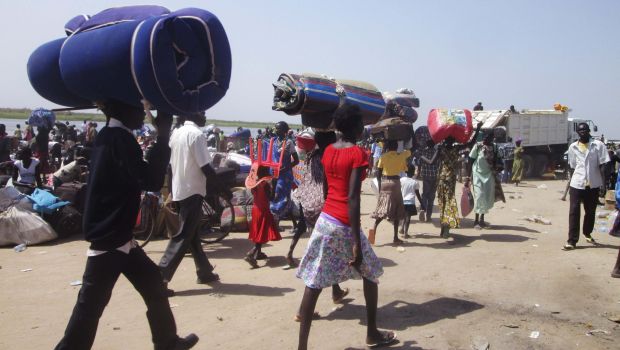
Displaced people carry their belongings as they flee from fighting between the South Sudanese army and rebels in Bor town, 180 km (112 miles) northwest from capital Juba December 30, 2013 (REUTERS/Stringer)
London, Asharq Al-Awsat— South Sudan’s government has ruled out power sharing with rebels as the two warring sides head to Addis Ababa to negotiate an end to the violence, a senior official told Asharq Al-Awsat on Tuesday.
Following weeks of violent clashes that have claimed well over a thousand lives, South Sudan’s President Salva Kiir and former vice-president Riek Machar have agreed to sit at the negotiating table following international calls for a ceasefire between the army and the rebels associated with Machar.
In exclusive comments to Asharq Al-Awsat South Sudan’s Deputy Foreign Minister Peter Bashir Bandi said negotiations in the Ethiopian capital would not cover any power sharing with the rebels, and he added: “The reinstatement of Machar as vice-president is completely impossible.”
He said: “Machar has to choose between continuing fighting or ceasefire, to begin the dialogue.”
According to Bandi, the government is committed to dialogue with the rebels, and Kiir is yet to name the delegation, accusing Machar of violating the ceasefire.
Meanwhile, violent clashes continued in the disputed city of Bor with dozens of civilians reported dead, eyewitnesses who spoke on condition of anonymity told Asharq Al-Awsat.
They said vast parts of the city fell to the “White Army,” a militia reported to be loyal to Machar.
According to Bandi, the Addis Ababa talks will mainly focus on the implementation of an internationally monitored ceasefire, the humanitarian situation in the country, and the release of prisoners who took part in the insurgency.
He said that his government had constitutional duties towards protecting the country’s territories and private and public property, and therefore would not accept any military coup or act of rebellion.
“It is not possible to negotiate with Machar while his forces are attacking the city of Bor,” he said, adding that the “clashes have left large numbers of deaths.”
For his part, Machar issued a press statement on Tuesday saying he agreed to an immediate cessation of atrocities, and accused the Ugandan army of involvement in the fighting.
“Uganda’s intervention will worsen the situation and affect the entire area,” the statement said.
Machar urged the African Intergovernmental Authority on Development (IGAD) and the African Union to place pressure on President Kiir to release rebel detainees who he said would lead his delegation team in the Addis Ababa talks.
Bandi denied claims that Ugandan forces had intervened in South Sudan, and accused Machar of leading a tribal rather than political insurgency.
